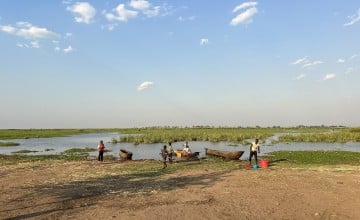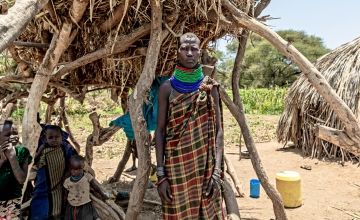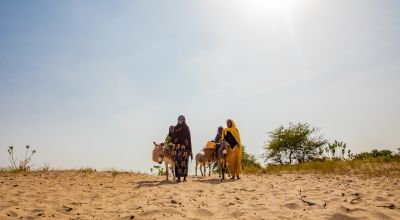
Read our 2024 annual report

Knowledge Hub
COP30 in Belém will mark a pivotal moment for global climate governance. Here’s what to expect.
Ten years after the signing of the Paris Agreement - an aim to limit the global average temperature to 2C above pre-industrial levels, and ideally keep the increase to 1.5C - countries are facing mounting pressure to translate past commitments into concrete outcomes.
Several agenda items are set to dominate discussions - reflecting both unresolved negotiations and the need for a renewed push towards implementation of the Paris agreement. The future of the Sharm el-Sheikh Dialogue under Article 2.1(c) will test how Parties align global finance flows with low-carbon, climate-resilient development. Linked to this are the contentious debates on Article 9.1 and the provision of finance by developed countries, alongside the Baku to Belém Roadmap to $1.3 trillion, which seeks to chart a credible pathway for scaling up climate finance.
On adaptation, Parties are expected to finalise the Global Goal on Adaptation (GGA) and determine the shape of the Baku Adaptation Roadmap (BAR), both crucial for enhancing resilience and directing resources to vulnerable countries. Finally, the spotlight will fall on the new generation of Nationally Determined Contributions (NDCs) - the ultimate test of collective ambition toward limiting global warming to 1.5°C. Together, these interconnected issues will define whether COP30 delivers the transformation needed to move from dialogue to decisive action.
Here’s what to look out for at COP30.
Sharm el-Sheikh Dialogue
Article 2.1(c) of the Paris Agreement calls for aligning finance flows with low-emission, climate-resilient development. Yet, after eight years, countries remain divided on its scope. The Sharm el-Sheikh Dialogue, launched in 2023 to clarify this, ends at COP30 with limited progress. Parties must decide whether to extend or replace it with a new process. The final report will summarise six workshops and propose reforms to global financial systems - addressing debt, trade, and taxation - to make finance more equitable and climate-aligned while assessing how debt burdens hinder funding for mitigation, adaptation, and loss-and-damage efforts.

Climate Finance Provision
Article 9 of the Paris Agreement requires developed countries to provide financial resources for developing countries’ mitigation and adaptation efforts. Arguments and suggestions from stakeholders include further discussion on mobilisation, enabling environments and voluntary contributions. Finding space for these issues will be key to breaking the finance deadlock and rationalising the COP30 agenda.
Baku to Belém Roadmap to $1.3 Trillion
This aims to scale up climate finance for developing countries to at least USD 1.3 trillion per year by 2035. Led by the Azerbaijani and Brazilian COP Presidencies, it follows from the new collective quantified goal agreed at COP29. Concerns remain about the process’s transparency and inclusivity. A draft report, delayed due to disagreements between the Presidencies, is now expected on 27 October, followed by a High-Level event at COP30. Beyond that, next steps remain unclear. Civil society and many Parties emphasise the need for the roadmap to prioritise public finance as the backbone of climate action.

Global Goal on Adaptation (GGA)
Under Article 7.1, the GGA aims to enhance adaptive capacity, strengthen resilience, and reduce vulnerability to climate change. The UAE–Belém Work Programme (2023–2025) was launched to develop measurable GGA targets and indicators and scale up adaptation finance. However, progress remains slow due to disagreements on responsibilities and the local nature of adaptation.
A related initiative, the Baku Adaptation Roadmap (BAR), seeks to guide post-2025 adaptation action. There is no consensus on its structure - some want a formal, binding framework, others a flexible platform. Adopting GGA indicators at COP30 will be critical to track progress and align support (finance, capacity-building, and technology). Scaling up adaptation finance and agreeing on the BAR’s purpose and relationship to the GGA will be key outcomes.
Nationally Determined Contributions (NDCs)
NDCs will be central to COP30 and the focus of the Leaders’ Summit. Under the Paris Agreement, countries must update NDCs every five years with increasing ambition toward the 1.5°C goal. As of 1 October, 61 countries (31% of global emissions) had submitted updated NDCs.. These are expected to be generally more detailed, but unfortunately, are still insufficient to close the 1.5°C or even 2°C gap.
COP30 must therefore outline a credible pathway to accelerate global climate action beyond current pledges.

Work Programme on Just Transition Pathways
Just Transition will be central to COP30, linking climate ambition with social justice and economic resilience. As countries commit to deeper emissions cuts, the shift from fossil fuels raises critical issues of jobs and equity. Under the UNFCCC, Parties are developing a framework to support fair transitions—protecting workers, promoting decent jobs, and strengthening social protection. COP30 is expected to advance the Work Programme on Just Transition Pathways, moving from principles to implementation. Watch out for a lot of talk of a Belem Action Mechanism for a Global Just Transition!
The Road Ahead
COP30’s negotiation agenda is vast but urgent. From finance reform to adaptation and just transitions, success will depend on whether nations can bridge divides and move from promises to practical progress—turning climate commitments into real-world change.





